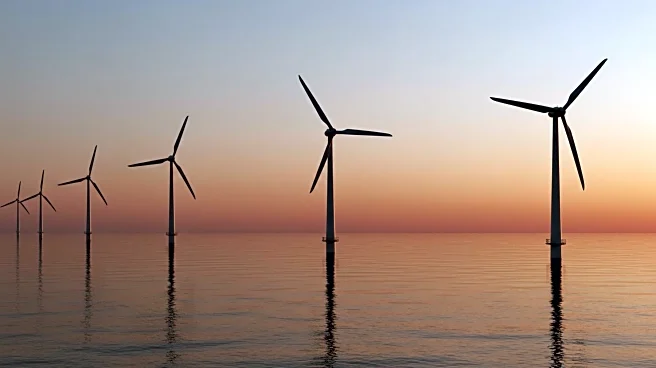What is the story about?
What's Happening?
The Trump administration has ordered a halt to the construction of the Revolution Wind project, an offshore wind farm located 15 miles south of Rhode Island. The decision was communicated by Matthew Giacona, acting director of the Bureau of Ocean Energy Management, citing concerns over national security interests. The project, developed by Danish firm Ørsted and Global Infrastructure Partners, was nearing completion and expected to supply power to Rhode Island and Connecticut by next year. This move follows a series of actions by the Trump administration targeting renewable energy, including a moratorium on new offshore wind projects and stricter IRS guidelines affecting tax incentives for wind and solar projects. The Commerce Department is also investigating the national security implications of wind turbine imports.
Why It's Important?
The halt on the Revolution Wind project underscores the Trump administration's broader stance against renewable energy, potentially affecting the U.S. energy landscape. Industry experts warn that such actions could increase electricity costs and deter investment in renewable energy, as they signal instability in U.S. energy policy. The decision could impact jobs, contracts, and communities benefiting from the project, as noted by Erik Milito of the National Ocean Industries Association. The move also raises concerns about the U.S.'s ability to meet rising energy demands with a diverse energy mix, including renewables. Critics argue that these actions undermine investor confidence and progress on national priorities like energy independence and infrastructure development.
What's Next?
Ørsted is evaluating options to resolve the issue, including potential legal action. The broader renewable energy sector may see increased advocacy and legal challenges as stakeholders seek to protect investments and projects. The decision could prompt further scrutiny and debate over the balance between national security and renewable energy development. Industry groups may push for policy changes to ensure a stable investment environment. The outcome of the Commerce Department's investigation into wind turbine imports could also influence future policy and project viability.
Beyond the Headlines
The halt on the Revolution Wind project highlights the tension between energy policy and national security concerns. It raises questions about the legal and regulatory framework governing renewable energy projects and the potential for political influence to disrupt industry progress. The decision may also affect international perceptions of the U.S. as a reliable partner in global energy markets, potentially impacting future collaborations and investments.

















